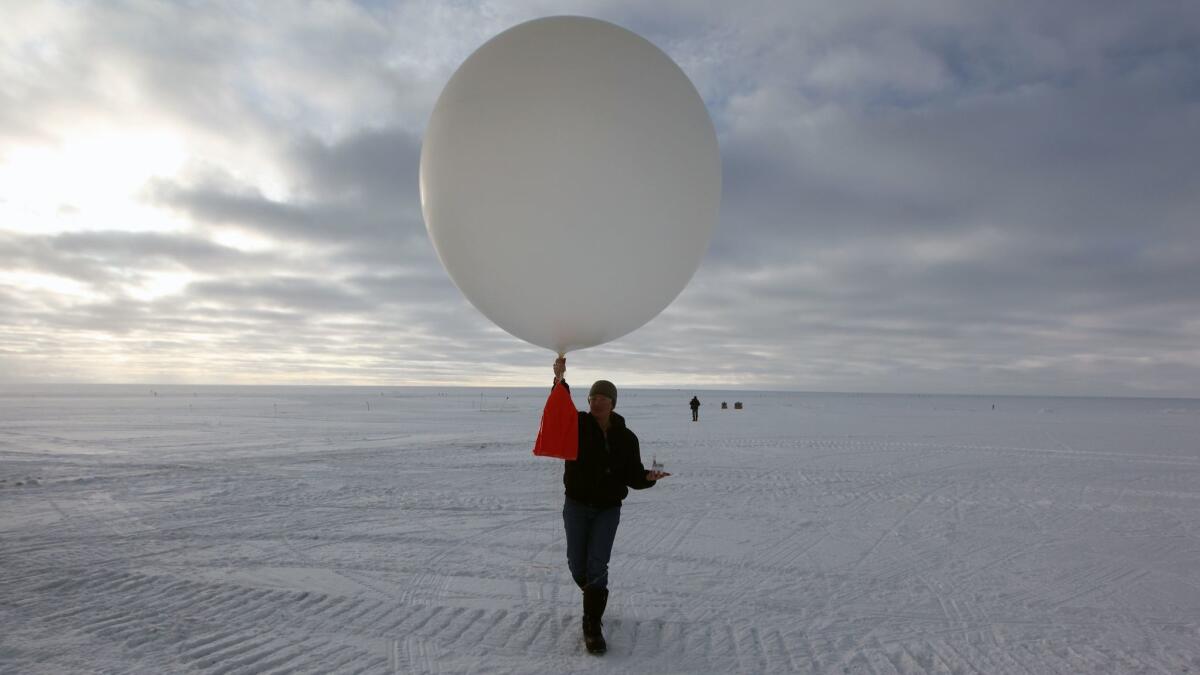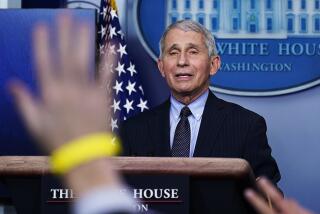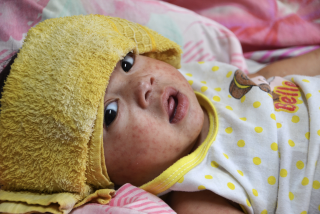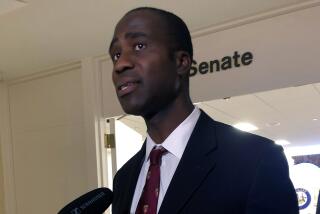Op-Ed: Why aren’t people listening to scientists?

Who would you trust more: a politician or a scientist? Even in our age of skepticism, I think more people would vote for the scientist. And yet politicians who challenge well-tested scientific theories are getting unprecedented traction of late. The whole concept of the expert is under extraordinary attack on both sides of the Atlantic.
To be fair, science often goes against intuition. As kids, we build up models in our heads to explain the world around us. The Earth appears to be flat. The sun appears to go around the Earth. Humans appear to be very different from mice. Only a careful presentation of evidence counters these intuitive stories.
Take the mouse genome. It contains nearly the same amount of base pairs — the ladder rungs of the double helix — as the human genome, about 3.1 billion. Only 5% of these base pairs are responsible for coding the proteins that make us what we are. The other 95% is junk. Of the important stuff, 85% of human genes are, on average, identical to those of the mouse.
If you are still reading this, you have already experienced one of the problems with countering intuition: It takes time to lay out evidence, and the evidence can be complicated. Although you don’t need a doctorate to understand the science, you do need time and a willingness to invest it in something other than the instantaneous news hits we’ve become accustomed to.
[Science] requires us to think collectively, for the good of humanity, rather than individually.
But even people who do put in the effort seem all too ready to dismiss scientific evidence. It’s not that they don’t believe the facts presented to them, exactly. It’s that they question whether those facts are relevant to their own situation.
Why, for example, are people rejecting the idea that vaccines are essential to preventing the spread of disease? The science is pretty clear. Every virus has something called a “reproduction number,” which represents the quantity of secondary infections produced by an infected individual in an unvaccinated population. Typically, influenza has a reproduction number of around two to three. Smallpox had a reproduction number of five to seven. Given the smallpox rate, epidemiologists predicted that inoculating 80% of the world population would successfully eradicate the virus. They were right.
We are currently experiencing a worrying growth in cases of measles. According to the World Health Organization, there were 134,200 measles deaths in 2015 — about 367 deaths every day, or 15 deaths every hour. We have a vaccine for measles. But because of its high reproduction number — 14 to 18 — measles will be eradicated only if we inoculate 95% of the population. A few irresponsible doctors have spread rumors that the measles, mumps and rubella vaccine is linked to autism. Their original study, published in the Lancet, was rescinded and repudiated, and thousands of scientists have come out to explain why the rumors are not true. Yet the fear persists.
Our approach as a society to countering deadly diseases hinges on what is called “herd immunity.” The concept requires us to think collectively, for the good of humanity, rather than individually. Think individually, and you might argue that there is a risk involved in taking any vaccine. But while there is a risk, it is often tiny. Herein lies one of the primary reasons for the dismissal of the expert, in my view: Rejectionists don’t believe that the scientist has their best interests at heart.
Perhaps it is up to scientists to better understand this psychology and take it into account when we present our conclusions. But scientists don’t always speak with one voice. Indeed, robust argument over the interpretation of data is a critical part of practicing science. Any new model must undergo questioning. This can be confusing to a public and government that want clear, definitive answers.
The public’s desire for certainty presents one of the biggest challenges for the scientific community, since tension between the known and unknown animates much of what we do. We are sure that our model of the cosmos is correct, while at the same time recognizing that new revelations could require that we reconsider it. We grow confident in a theory if it is confirmed every time we test it, and yet, as the great philosopher of science Karl Popper pointed out, a theory is considered scientific only if it can be falsified — that is, if it has the potential to be challenged.
But while new evidence may reveal that a model is awry, such revelations do not throw all of science into question. The discovery of a new subatomic particle doesn’t challenge our understanding of biology or gravity. That science is constantly improving does not mean it is always wrong.
Scientists could help bridge the gulf in understanding by engaging more with the public, particularly when it comes to research that will have a big impact on society. In fact, this should be part of our job descriptions. Not one-way lecturing, but a genuine exchange. We need to show our work, as a teacher of mine used to say — to not just present but elucidate the evidence for climate change, for evolution, for all of the scientific theories we have developed to explain our place in the universe. People don’t want experts telling them how it is. They want to understand how we arrived at our conclusions.
This weekend, many scientists around the world gathered to take a stand against the attack on science. Though it feels good to march, protests signs alone won’t convince. Only a sustained dialogue with the public will do that.
Marcus du Sautoy is Simonyi Professor for the Public Understanding of Science and Professor of Mathematics at the University of Oxford and the author of “The Great Unknown.”
Follow the Opinion section on Twitter @latimesopinion or Facebook
More to Read
A cure for the common opinion
Get thought-provoking perspectives with our weekly newsletter.
You may occasionally receive promotional content from the Los Angeles Times.






